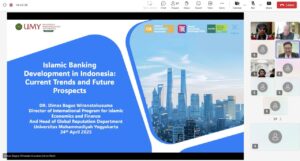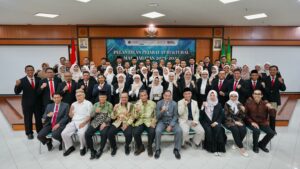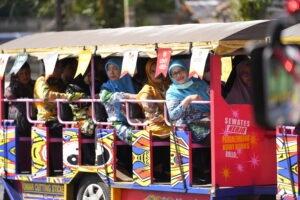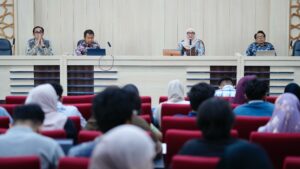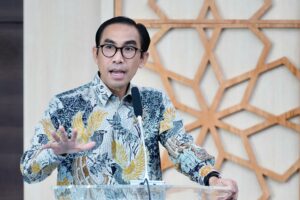
Television programs turn to be fascinating shows for human beings. Nevertheless, the television programs in Indonesia are increasingly contravening the rules. Law No. 32/2002 on broadcasting law and P3SPS (Guidance, Behavior, Broadcasting of Broadcasting Program Standard), codified by Indonesia Broadcasting Commission (KPI), does not decline that television programs break regulations and ethics. It grows more attention, particularly in political issues in television, violence, sexuality, and television program of mystic.
It was the statement of Fajar Juanedi, S.Sos., M.Si. interviewed on Wednesday (14/1) in Public Relation and Protocol Office (BHP) Universitas Muhammadiyah Yogyakarta (UMY) dealing with the book launching of Broadcasting students of Communication Sciences of UMY 2014 entitled “Believe in TeLievisi” (Exposing Lie on Television Programs). It was held on Saturday evening (10/1) in Playground Café of Yogyakarta. It was also inviting Filosa Gita Sukmono, S.Ikom., M.A. as the speaker of IK UMY’s lecturer representative, Widodo Imam Kurniadi as the speaker of MPM (Media Care Community), Galuh, and Erwin Rasyid as the author.
The book writing involving 49 broadcasting students of Communication Sciences of UMY 2014 had primarily conducted a research of television programs using a parameter of the existing ethics and regulations, “The ethics encompass normative and descriptive ethics developing in society as normative ethic discusses broadcasting law and P3SPS,” stated Fajar.
Fajar explained that the study observed programs on television. “From the programs, it was described and then determined points of contravened regulations and ethics. The points would be correlated to communication theories learnt at class,” he elucidated.
Assigning the huge theme, according to Fajar, students took entire roles while lecturers acted as facilitators for students’ work. “Hence, students would work collectively and provide suggestion for their friends. It is students’ work, and I just facilitate them to always work. Additionally, the book making process has been running for a semester,” he conveyed.
Fajar told that students’ roles in criticizing media were momentous since it could be the obvious work. “The book writing could provide occasion for students to contribute to recommend regulations for KPI or KPID and television industry. Thus, in this context students or university are not only as ‘luxurious building’,” uttered Fajar.
Fajar expected that this book could be students’ portfolio to work steadily, and they could have forte to compete in work place. It afforded opportunities for students to express their idealism in creating work academically, and not through demonstrating. “This work trains students to carry out entrepreneurship that students publish the book by their own saving and by looking for sponsorship. The book sale would later be for themselves,” he continued.
Furhtermore, one of IK UMY’s students, also becoming the moderator in the launching book, explained that on the book Broadcasting students of IK UMY attempted to criticize existing television programs. “On the book, the authors try to criticize television programs. Four issues or huge themes raised on this book are Violence, Sexuality, Mystic, and News Neutralization,” he expounded.
Naswan added that on the Violence chapter was discussed several television programs having high intensity of violence, both verbal and nonverbal. “On the Sexuality chapter was presented some television programs having high intensity of both verbal and nonverbal sexual action. On the Mystic chapter was talked about programs related to Islamic values. Whilst, on the News Neutralization was explored media alignment in laying out news in an event or issue,” he uttered.

